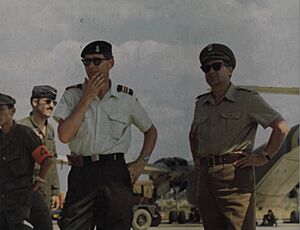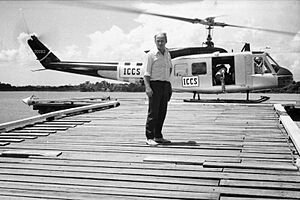International Commission of Control and Supervision facts for kids
The International Commission of Control and Supervision (ICCS) was an international group created on January 27, 1973. Its main job was to help keep the peace in Vietnam after the Paris Peace Accords were signed. This agreement was meant to end the Vietnam War. The ICCS took over from a similar group called the International Commission for Supervision and Control in Vietnam (ICSC).
Contents
Who Was Involved?
The ICCS was made up of military and civilian staff from four different countries. These countries were chosen to represent both communist and non-communist nations.
Initially, the countries were:
Canada and Poland had been part of a similar group for almost 20 years. Hungary and Indonesia were new to this kind of work. Canada was a member from January 29 to July 31, 1973. After that, Iran took Canada's place and served from 1973 to 1975.
Leaders of the Teams
Some of the main leaders from each country included:
- 1973: Michel Gauvin from Canada.
- 1973: Eugeniusz Kulaga from Poland.
- 1973-1974: Károly Kovács from Hungary.
How Many People?
Each of the four countries sent 290 people to the ICCS.
- Poland: 290 people
- Hungary: 290 people
- Indonesia: 290 people
- Canada or Iran: 290 people
- In total, about 1,160 people worked for the ICCS at any one time.
People who served for at least 90 days with the ICCS could receive the International Commission of Control and Supervision Medal. It's thought that around 3,000 people might have earned this award over time.
What Did They Do?
The Paris Agreement explained all the tasks of the ICCS. Their main roles included:
- Supervising the cease-fire (when fighting stops).
- Watching over the withdrawal of troops.
- Making sure military bases were taken apart.
- Monitoring activity at ports where new weapons might enter.
- Overseeing the return of captured soldiers and civilians.
The ICCS had to report if the peace agreement was being followed or if there were violations. The communist and non-communist nations often disagreed about who was breaking the rules. Canada tried to tell the world about these issues through the media.
ICCS Air Travel
Traveling by air was often the safest and fastest way for the ICCS to move around. This was especially true in a conflict zone with mountains and jungles. The ICCS hired a company called Air America for their air services. These planes were painted white and had "ICCS" written on them.
Sad Losses
On April 7, 1973, two ICCS helicopters were attacked in Quảng Trị Province. One helicopter was hit by machine-gun fire but landed safely. The other was hit by a missile and crashed, with no survivors. The helicopters were carrying teams on inspection duties. This meant that people from all four contributing nations, plus the flight crew, were among the casualties.
It is believed that nine people were killed in this incident:
- Lieutenant Colonel Gunawan Salam Faiman from Indonesia.
- Captain Csaba Cziboly from Hungary.
- Major Aurél Dylski from Hungary.
- Captain Charles Laviolette from Canada. He was the only Canadian to die with the ICCS.
- Two officers from the Provisional Revolutionary Government of the Republic of South Vietnam (Viet Cong).
- CPT. Terry D. Clark, pilot, from the United States.
- CPT. Charles L. Osterman, co-pilot, from the United States.
- Valeriano P. Rosales, crew-chief, from the Philippines.
During the time the ICCS was active, there were many alleged cease-fire violations. These led to many people being killed, wounded, or missing on both sides. On May 29, 1973, Canada announced it was leaving the ICCS. They stated that they had come to supervise a cease-fire but were instead observing a war.



